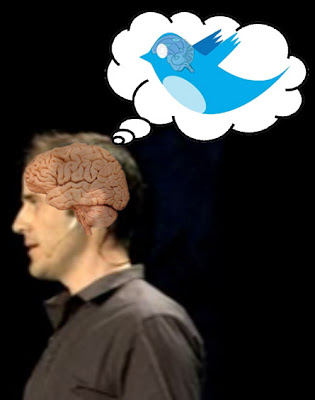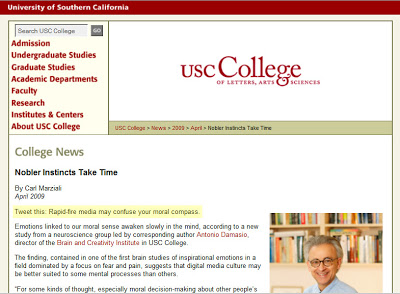Neuroscience

You think you've already seen the worst coverage of the "Twitter makes you amoral" scare [with a BONUS! overblown sound byte from the first author]...

Before you can fully process the heartbreak of the German girl not getting the car she wanted, you can fleetingly enjoy the vicarious thrill of being followed by Britney Spears.
And finally we have time-tested scare tactic, corruption of the youth of society:

That press release has since been changed to have the Tweet this subtitle removed, as well as having one sentence truncated:

Most of the usual regurgitated news outlets have kept the Tweet this: Rapid-fire media may confuse your moral compass headline, but EurekAlert! decided to take the nobler tact with an unacknowledged edit. [If you edit such things after press time, aren't you supposed to acknowledge that, or else change the date? I guess not.]
John Timmer at Ars Technica found some finger-pointing on both sides:

For the results of a hypothetical (fake) fMRI study of Twitter, read Part 1 in this series: The Neurology of Twitter.
- Facebook Or Twitter: What Does Your Choice Of Social Networking Site Say About You?
Social networking sites have changed our lives. There were 500 million active Facebook users in 2011 and approximately 200 million Twitter accounts. As users will know, the sites have important differences. Facebook places more of an emphasis on...
- Twitter As An Incubator Of Swine Flu Misinformation
xkcd Randall Munroe is not that far off... Foreign Policy's net.effect blog is one of many blogs with a story about this: Swine flu: Twitter's power to misinformSat, 04/25/2009 - 5:56pmWho knew that swine flu could also infect Twitter? Yet this...
- Neural Correlates Of Admiration And Compassion And Envy And Schadenfreude
In light of all the sensationalistic press coverage about a journal article that wasn't publicly available last week, it's worth taking a moment to look at the actual experiment. Of course, the savvy skeptics know by now that the paper in question...
- "#hashtags In The Academy" At #scio13 On Storify
@Lalsox and my session called #Hashtags in the academy: Engaging students with social media was a great success! We had lots of great conversation which generated some (unanswered) questions as well as some terrific ideas about using social...
- Web 2.0 For My Friends Or, A Facebook Frenzy!
In thinking back over 2008, one of the best things about the year was the proliferation of friends, buddies, and acquaintances I met. For the most part, this meeting took place online, through various social networking sites like Facebook, Twitter, and...
Neuroscience
The Neurology of Twitter, Part 2

You think you've already seen the worst coverage of the "Twitter makes you amoral" scare [with a BONUS! overblown sound byte from the first author]...
Scientists warn of Twitter dangersBut then Bad Science comes along with these gems from the British press:(CNN) -- Rapid-fire TV news bulletins or getting updates via social-networking tools such as Twitter could numb our sense of morality and make us indifferent to human suffering, scientists say.New findings show that the streams of information provided by social networking sites are too fast for the brain's "moral compass" to process and could harm young people's emotional development.Before the brain can fully digest the anguish and suffering of a story, it is being bombarded by the next news bulletin or the latest Twitter update, according to a University of Southern California study."If things are happening too fast, you may not ever fully experience emotions about other people's psychological states and that would have implications for your morality," said researcher Mary Helen Immordino-Yang.
- Story Highlights
- USC study says rapid-fire Twitter and news updates are too fast for brain
- Scans show humans respond rapidly to pain, but not compassion, admiration
- Scientists say reliance on news snippets could harm moral compass
Facebook and Twitter 'make us bad people'Using Facebook or Twitter may make you a bad person because it ruins your moral compass, it has been claimed.[Where did Miles Erwin get that quote? "...it has been claimed"? by whom?]
Twitter and Facebook could harm moral values, scientists warnToday's fast-paced media could be making us indifferent to human suffering and should allow time for us to reflect, according to researchers.They found that emotions linked to moral sense are slow to respond to news and events and have failed to keep up with the modern world.In the time it takes to fully reflect on a story of anguish and suffering, the news bulletin has already moved on or the next Twitter update is already being read.[Does anyone know of a rapidly changing Twitter news stream for anguish and suffering?]

Before you can fully process the heartbreak of the German girl not getting the car she wanted, you can fleetingly enjoy the vicarious thrill of being followed by Britney Spears.
via Twistori.
And finally we have time-tested scare tactic, corruption of the youth of society:
Twitter can make you immoral, claim scientistsSocial networks such as Twitter may blunt people's sense of morality, claim brain scientists.New evidence shows the digital torrent of information from networking sites could have long-term damaging effects on the emotional development of young people's brains.A study suggests rapid-fire news updates and instant social interaction are too fast for the 'moral compass' of the brain to process.The danger is that heavy Twitters and Facebook users could become 'indifferent to human suffering' because they never get time to reflect and fully experience emotions about other people's feelings.As has been covered elsewhere (The Frontal Cortex, Ars Technica), the connection between Twitter and a journal article entitled Neural correlates of admiration and compassion was originally made by the USC Press office.

That press release has since been changed to have the Tweet this subtitle removed, as well as having one sentence truncated:

Most of the usual regurgitated news outlets have kept the Tweet this: Rapid-fire media may confuse your moral compass headline, but EurekAlert! decided to take the nobler tact with an unacknowledged edit. [If you edit such things after press time, aren't you supposed to acknowledge that, or else change the date? I guess not.]
John Timmer at Ars Technica found some finger-pointing on both sides:
We contacted the press office at USC, which produced the release. The person who prepared the release told us that the authors of the paper had read and approved it prior to its dissemination, which is standard procedure for university press offices. More generally, he said that the broad focus on what the study might say about modern media was the product of the authors' desire to discuss the societal implications of their work.We also managed to talk briefly with Antonio Damasio, one of the authors of the study who was quoted in the press release. Damasio sounded concerned about the presentation of the work in the press release, and asked for confirmation of its wording. He specifically stated, "I would not have used Twitter," and said that he intended to look over the contents of the press release after he got off the phone.Maybe they're both right: perhaps the first author (Mary Helen Immordino-Yang) is the one who approved the anti-social-media message. Despite that possibility,
Immordino-Yang did not blame digital media. "It's not about what tools you have, it's about how you use those tools," she said.Whichever way it happened, Timmer wisely notes:
He goes on to discuss the lengthy embargo system employed by the journal that published the paper, Proceedings of the National Academy of Sciences (PNAS), and how a week-long delay between press coverage and access to the article by non-press scientific experts does no one any good. The Neurocritic has complained about PNAS's embargo policy for some time now (for instance, three years ago in The PNAS Word, and more recently here and here).Overall, it's not clear how the press release wound up straying so far from the scientific content of the paper. It's certainly fair for researchers to consider the social implications of their work, but a different thing entirely to imply that those implications are a direct outcome of rigorous, peer-reviewed research.
I think it's safe to say that the way this research reached the public did nobody any favors. The studies leant themselves to headlines that oversold the underlying research and, given the current attention span, it's likely that many readers never got much past the headline.

via Twistori [with some edits].
For the results of a hypothetical (fake) fMRI study of Twitter, read Part 1 in this series: The Neurology of Twitter.
- Facebook Or Twitter: What Does Your Choice Of Social Networking Site Say About You?
Social networking sites have changed our lives. There were 500 million active Facebook users in 2011 and approximately 200 million Twitter accounts. As users will know, the sites have important differences. Facebook places more of an emphasis on...
- Twitter As An Incubator Of Swine Flu Misinformation
xkcd Randall Munroe is not that far off... Foreign Policy's net.effect blog is one of many blogs with a story about this: Swine flu: Twitter's power to misinformSat, 04/25/2009 - 5:56pmWho knew that swine flu could also infect Twitter? Yet this...
- Neural Correlates Of Admiration And Compassion And Envy And Schadenfreude
In light of all the sensationalistic press coverage about a journal article that wasn't publicly available last week, it's worth taking a moment to look at the actual experiment. Of course, the savvy skeptics know by now that the paper in question...
- "#hashtags In The Academy" At #scio13 On Storify
@Lalsox and my session called #Hashtags in the academy: Engaging students with social media was a great success! We had lots of great conversation which generated some (unanswered) questions as well as some terrific ideas about using social...
- Web 2.0 For My Friends Or, A Facebook Frenzy!
In thinking back over 2008, one of the best things about the year was the proliferation of friends, buddies, and acquaintances I met. For the most part, this meeting took place online, through various social networking sites like Facebook, Twitter, and...
